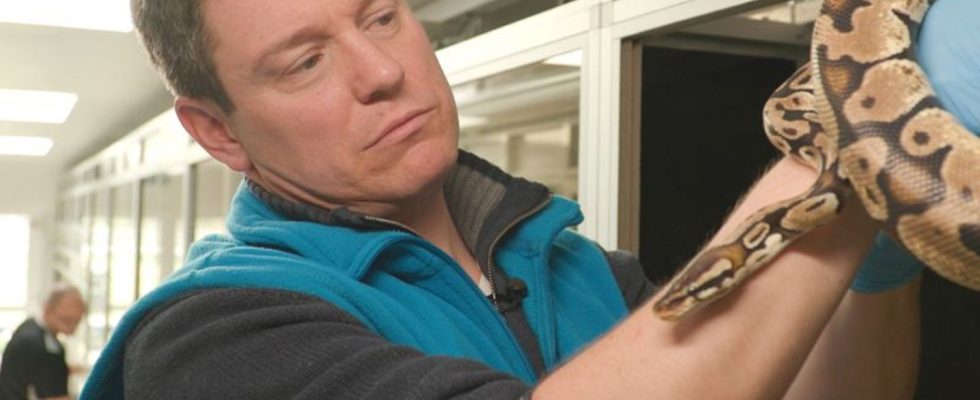TV tip
When Animals Are in Distress – “Creatures Like Us”
The animal rights activist Patrick with a reticulated python that ended up in the animal protection center after being confiscated. photo
© Thomas Beckmann/ZDF/dpa
It’s still vacation time. Unfortunately, this also means that many pets no longer have a home because they are abandoned. A ZDF report tells about it.
Pets can also unexpectedly get into trouble. Especially when people simply leave them behind somewhere because they are said to be just a burden. The report “Creatures like us” from the renowned series “37 degrees” tells of people who save animals. It can be seen this Monday at 11:50 p.m 3 sat.
“For me, animal welfare means seeing the animals with their eyes and senses,” says Patrick in the film. The 42-year-old is a biologist, bear and reptile expert and works at the Weidefeld Animal Protection Center in Kappeln an der Schlei, a facility of the German Animal Welfare Association. There, together with his 22 colleagues, he takes care of almost 500 animals every day, including bears, pot-bellied pigs, monkeys and snapping turtles. On the former military area you will find very good protection from cold and heat in the former bunkers.
people and animals with disabilities
At the Lebenshof Lana (which is expressly not a sanctuary) near Jena, the socio-educational family worker Sabine (41) and her team from the association “Die Seeletröster – animals help people” take care of a total of around 25 rabbits, 23 chinchillas, 3 guinea pigs and 40 dogs. With food, laundry service and lots of cuddling.
Some of the animals come from terrible housing conditions: a Maltese bitch had her vocal cords severed because she is said to have barked too loudly and too much. A pug with a broken spine in a wheelchair is affectionately called “Rollmops”. Many other animals are sick and old. Sabine brings them together with young people who have a disability.
Martina (50) from Hochheim am Main discovered more than 80 stray cats in a garden near her, which are multiplying quickly and uncontrollably. Martina used to not like cats at all. But in 2019 she founded the “Strayer Aid” project, set up a feeding station, provided the velvet paws with medication and also had them castrated. 50 to 60 hours a week go into their commitment, not counting the weekends. Unfortunately, not all fellow human beings find this work good, the cat tent was set on fire with an accelerant, a complaint was made – fortunately the residents were able to escape unharmed.
caring and passion
Author Volker Schmidt-Sondermann (58, “Verzockt. When gambling becomes an addiction”) presents these very special people, all of whom are volunteers and extremely caring and put a lot of heart and soul into taking care of homeless or ownerless animals, with a lot of empathy for them. You can see their joy at work, but also the zest for life of the four-legged friends and birds, who give their carers a lot of affection in return.
The question remains why so many people part with a previously loved animal (of which they often know far too little about) in such a brutal manner and simply leave it to its fate.
Many abandoned animals were purchased for company during the Corona pandemic. Now they are supposedly just ballast, the sense of responsibility for them is simply lost, and so the animals supposedly have to go urgently. Unfortunately, such people can rarely be prosecuted for their criminal behavior. However, there is a risk of heavy fines.

